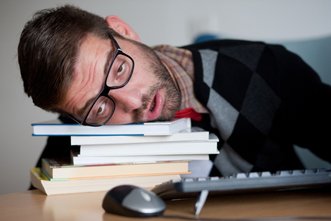Less sleep equals more productivity. Or, is it just more time I could be productive? Probably the latter, but still. I just have to use that time wisely and losing sleep is worthwhile, right?

Foolproof logic really, the later you stay up the more time you’ll have to get your life together. Something we all need a bit more of. But, in doing so, you’re betting on a costly trade-off. For adults (18-64) between 6 and 11 hours may be appropriate, with the ideal range around 7 to 9 hours. Outside of this range, even a single night, will cost you.
What could really go wrong though?
Oh, yea know, just a myriad of health problems.
- Headaches
- Stress
- Possible early onset Alzheimer's & Dementia
- Early Death
- Less time for the body to heal
- Greater difficulty consolidating memories
- Inability to think clearly
- Brain loses time on rehearsing difficult problems
- Your mind having the reaction time of a hangover
What’s that? It’s not that bad is it? Well, according to some scientists, the problem is very real. Participants in that study were only moderately sleep deprived 17-19 hours without. Five to seven hours of sleep is all it took for individuals in the study to respond on tests as if they had a blood-alcohol-level above 0.05%. That’s almost the legal limit if you’re wondering, or just forgot.
And this is all in order to have the opportunity to get more work done. There’s no guarantee here.

Oh, by the way, you will make up for that sleep one way or another. You’ll go to bed early, wake up late, or just suffer the permanent damage caused to your brain and whatever short-term effects come associated with poor reaction time and a lack of focus.
What to do, what to do.
Alright, no need to beat a dead horse. We’ve probably all heard that, “sleep is important” from every adult who mattered in our life. They know it is, because eventually they get pushed to their limits, probably break, and start sleeping more. Adults are really good at sleeping and keeping to their schedule. And, as a future mature adult myself I’ve realized that pumping myself full of caffeine hasn’t been the panacea I’d hoped.
So, how do we get there?
Let’s be straight. The things that keep us up frequently are almost never serious. We get distracted by the internet, television, and good books. None of which we’ll be able to fully enjoy sleep deprived. Your brain will gets clouded. You end up rereading pages, you can’t remember what happened in the latest episode, and even think a terrible meme or video was hilarious.
My issue and possibly yours, was a lack of self-control.
It’s just so easy to ignore sleep for near term pleasure. It’s why we make a lot of poor choices. Temptation is a bitch.
Walter Mischel, a brain behind The Marshmallow Test and a researcher of self-control for almost 60 years has some devilishly simple advice; think about it. We’re not just brushing things aside. No, “I’ll go to bed soon”, or “I’ll be fine in the morning.” Really give yourself the space to identify the pros and cons of staying up late and what’s expected of you the next day. Mischel calls this, “Thinking Hot and Cool”.
The strategy goes like this, we want to heat the rewards of the positivity activity, going to sleep earlier, and cool the temptation we’re experiencing now, staying up later. For me, I think about how nice it’s going to be waking up without a headache or having to listen to my alarm. And, on the other side, I make it as real as possible that staying up is going to cause me to drink copious amounts of caffeine and make it even harder to want to go to work.
We want these scenarios to be real. We want to feel like we’re experiencing these outcomes so that we truly grasp whats at stake; a really shit morning.
So, please, go to bed.
Further Reading:
Trouble falling asleep? Check these tips from the Sleep Foundation.
Keep up the great work @sharper333
Upvoted